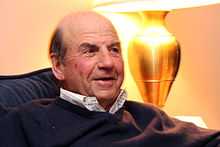Calvin Trillin
| Calvin Trillin | |
|---|---|
 | |
| Born |
Calvin Marshall Trillin December 5, 1935 Kansas City, Missouri |
| Nationality | American |
| Spouse(s) | Alice Stewart Trillin (1965–2001; her death; 2 children) |
| Awards | 2013, Thurber Prize for American Humor |
Calvin Marshall Trillin (born December 5, 1935) is an American journalist, humorist, food writer, poet, memoirist and novelist.[1]
Biography
Calvin Trillin was born in Kansas City, Missouri in 1935 to Edythe and Abe Trillin.[2] During an interview on the Charlie Rose Show on February 21, 2013 where he was discussing his book, Dogfight, he said his parents called him "Buddy".[3] He attended public schools in Kansas City and went on to Yale University, where he was the roommate and friend of Peter M. Wolf, (for whose 2013 memoir, My New Orleans, Gone Away, he wrote an amusing foreword) and where he served as chairman of the Yale Daily News and was a member of the Pundits and Scroll and Key before graduating in 1957;[4] he later served as a Fellow of the University. After a stint in the U.S. Army, he worked as a reporter for Time magazine before joining the staff of The New Yorker in 1963.[5] His reporting for The New Yorker on the racial integration of the University of Georgia was published in his first book, An Education in Georgia. He wrote the magazine's U.S. Journal series from 1967 to 1982, covering local events both serious and quirky throughout the United States.
He has also written for The Nation magazine. He began in 1978 with a column called Variations, which was eventually renamed Uncivil Liberties and ran through 1985. The same name – Uncivil Liberties – was used for the column when it was syndicated weekly in newspapers, from 1986 to 1995. Essentially the same column then ran without a name in Time magazine from 1996 to 2001. His humor columns for The Nation often made fun of the editor of the time, Victor Navasky, whom he jokingly referred to as the wily and parsimonious Navasky. (He once wrote that the magazine paid "in the high two figures.") From the July 2, 1990, issue of The Nation to today, Trillin has written his weekly "Deadline Poet" column – humorous poems about current events. Trillin has written considerably more pieces for The Nation than any other person.
Family, travel and food are also themes in Trillin's work. Three of his books American Fried; Alice, Let's Eat; and Third Helpings; were individually published and are also collected in the 1994 compendium The Tummy Trilogy. In 1965, he married the educator and writer Alice Stewart Trillin with whom he had two daughters. Alice died in 2001. The most autobiographical of his works are Messages from My Father, Family Man, and an essay in the March 27, 2006, New Yorker, "Alice, Off the Page", discussing his late wife. A slightly expanded version of the latter essay, entitled About Alice, was published as a book on December 26, 2006. In Messages from My Father, Trillin recounts how his father always expected his son to be a Jew, but had primarily "raised me to be an American".[6]
He has also written a collection of short stories – Barnett Frummer Is An Unbloomed Flower (1969) – and three comic novels, Runestruck (1977), Floater (1980), and Tepper Isn’t Going Out (2001). This last novel is about a man who enjoys parking in New York City for its own sake and is unusual among novels for exploring the subject of parking.
In 2008, The Library of America selected the essay Stranger with a Camera for inclusion in its two-century retrospective of American True Crime.
In 2012, he was awarded the Thurber Prize for American Humor for Quite Enough of Calvin Trillin: Forty Years of Funny Stuff, published by Random House. In 2013, he was inducted into the New York Writers Hall of Fame.
Trillin lives in the Greenwich Village area of New York City.
Bibliography
References
- ↑ "Calvin Trillin". The Nation. Retrieved 2013-03-17.
- ↑ "My Favorite Things: Calvin Trillin". Retrieved 2013-03-17.
- ↑ "Calvin Trillin". Charlie Rose. Retrieved 2013-03-17.
- ↑ The Yale Banner, History of the Class of 1957.
- ↑ "Contributors – Calvin Trillin". The New Yorker. Retrieved 2013-03-17.
- ↑ Trillin, Calvin. Messages from My Father, p. 101. Macmillan Publishers, 1997. ISBN 0-374-52508-0. Accessed August 31, 2011. ""My father took it for granted that I would always be Jewish, whatever the background of the person I married. On the other hand, he didn't exactly raise me to be a Jew; he raised me to be an American."
External links
- Column archive at The Nation
- Appearances on C-SPAN
- Calvin Trillin at the Internet Movie Database
- Works by or about Calvin Trillin in libraries (WorldCat catalog)
- Calvin Trillin collected news and commentary at The New York Times
- Calvin Trillin at the Notable Names Database
- George Plimpton (Fall 1995). "Calvin Trillin, The Art of Humor No. 3". The Paris Review.
- Alex Altman (December 1, 2008). "Q & A Calvin Trillin". Time.
- "Calvin Trillin Is Going Out — to Eat (Again)", Dave Weich, Powells.com
- Strolling and Snacking with Calvin Trillin The New York Times
- "The Salon Interview: Calvin Trillin"
- "Chillin’ with Calvin Trillin" Interview by Pamela Ryckman, The Brooklyn Rail (June 2005)
- Politics In Verse With Calvin Trillin Interview.
|